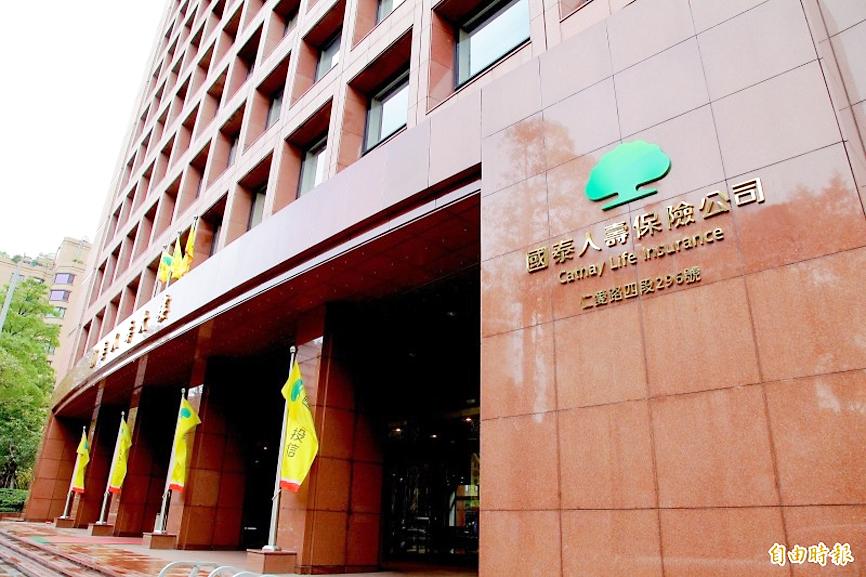Cathay Life Insurance Co (國泰人壽) yesterday reported a recurring yield of 3.29 percent as of the end of September, down from 3.8 percent a year earlier, as it takes a more cautious investment strategy amid the COVID-19 pandemic.
Recurring yield is a financial measure that shows how much a company earns from its investment on a regular basis.
Cathay Life registered recurring yields from a range between 3.47 and 3.8 percent during the January-to-September period over the past four years, company data showed.

Photo: Allen Wu, Taipei Times
Cathay Life was more proactive in taking advantage of the market volatility to sell stocks and secure capital gains than it was in the past few years, as it predicted that companies would distribute less cash dividends amid the pandemic, executive vice president Lin Chao-ting (林昭廷) told an investors’ conference in Taipei.
“We did not want to hold stocks just to get the dividends while losing the opportunity to earn the spread,” Lin said.
As the life insurer sold more stocks, it earned cash dividends of NT$16.2 billion (US$562.30 million) as of the end of September, down 34 percent from a year earlier, which trimmed its recurring yield by 16 basis points, he said.
Cathay Life preferred investment targets with higher credit ratings to avoid risks and disposed of those with ratings lower than triple B, which also reduced its recurring yield by 6 basis points, Lin said.
“Now we concentrate on those with ratings of triple B and A, while those with ratings of double B or lower only made up 1.6 percent of our investment portfolio, from 4.2 percent a year earlier,” Lin said.
A lower interest rate environment was also responsible for the drop in its recurring yield, he said.
Despite the lower recurring yield, Cathay Life booked capital gains of NT$112.7 billion for the first nine months of this year, which hit a record high and boosted the insurer’s cumulative net profit to a new high of NT$44.8 billion over the period.
Cathay Life said it would decide whether to raise its stake in Indonesia’s Bank Mayapada Internasional Tbk PT from 37.33 percent to 51 percent by the end of this year, after it in August booked an investment loss of NT$8.8 billion due to concerns about the lender’s operations amid a corporate scandal.

NEW IDENTITY: Known for its software, India has expanded into hardware, with its semiconductor industry growing from US$38bn in 2023 to US$45bn to US$50bn India on Saturday inaugurated its first semiconductor assembly and test facility, a milestone in the government’s push to reduce dependence on foreign chipmakers and stake a claim in a sector dominated by China. Indian Prime Minister Narendra Modi opened US firm Micron Technology Inc’s semiconductor assembly, test and packaging unit in his home state of Gujarat, hailing the “dawn of a new era” for India’s technology ambitions. “When young Indians look back in the future, they will see this decade as the turning point in our tech future,” Modi told the event, which was broadcast on his YouTube channel. The plant would convert

‘SEISMIC SHIFT’: The researcher forecast there would be about 1.1 billion mobile shipments this year, down from 1.26 billion the prior year and erasing years of gains The global smartphone market is expected to contract 12.9 percent this year due to the unprecedented memorychip shortage, marking “a crisis like no other,” researcher International Data Corp (IDC) said. The new forecast, a dramatic revision down from earlier estimates, gives the latest accounting of the ongoing memory crunch that is affecting every corner of the electronics industry. The demand for advanced memory to power artificial intelligence (AI) tasks has drained global supply until well into next year and jeopardizes the business model of many smartphone makers. IDC forecast about 1.1 billion mobile shipments this year, down from 1.26 billion the prior

People stand in a Pokemon store in Tokyo on Thursday. One of the world highest-grossing franchises is celebrated its 30th anniversary yesterday.

Zimbabwe’s ban on raw lithium exports is forcing Chinese miners to rethink their strategy, speeding up plans to process the metal locally instead of shipping it to China’s vast rechargeable battery industry. The country is Africa’s largest lithium producer and has one of the world’s largest reserves, according to the US Geological Survey (USGS). Zimbabwe already banned the export of lithium ore in 2022 and last year announced it would halt exports of lithium concentrates from January next year. However, on Wednesday it imposed the ban with immediate effect, leaving unclear what the lithium mining sector would do in the